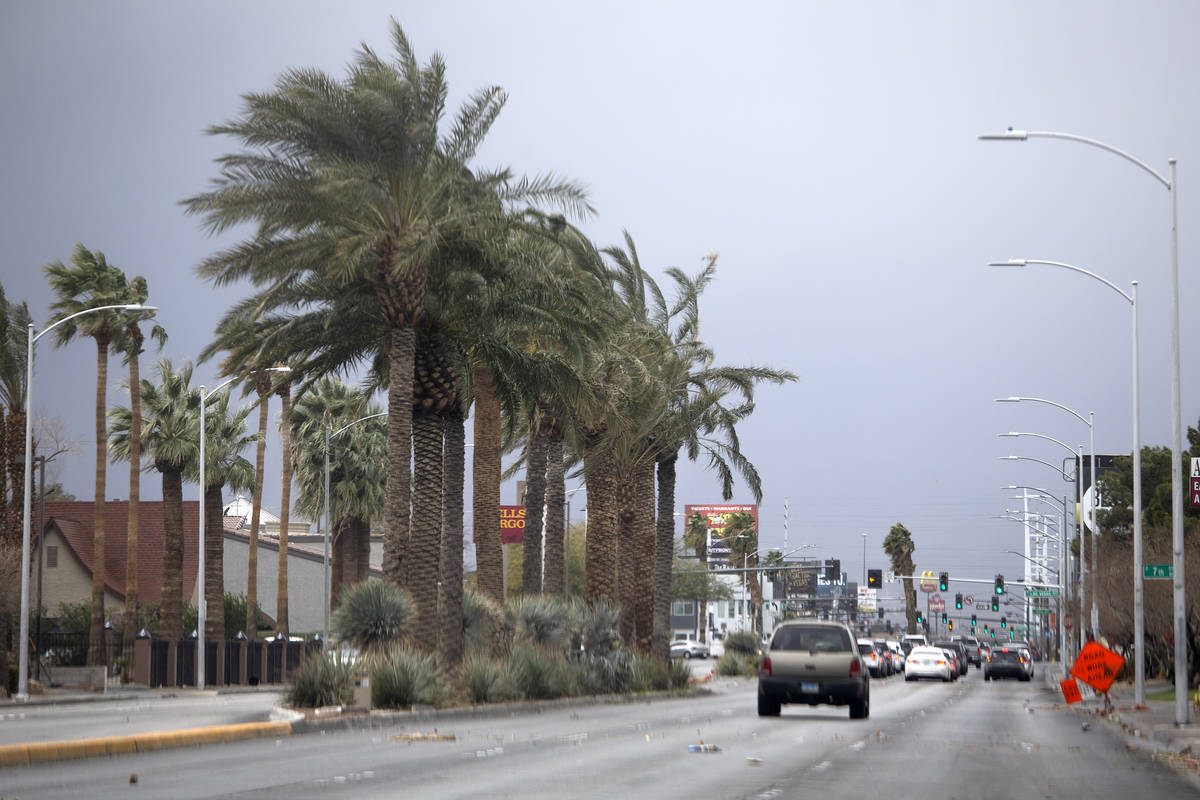$3B high capacity transit system proposed for Charleston Boulevard

A local company is exploring the construction of a high-capacity transit system along Charleston Boulevard that could cost as much as $3 billion to build.
Axios Nevada LLC and the city of Las Vegas entered an exclusive negotiation agreement to discuss the viability of the project, which would be privately owned and operated. That agreement, approved by the city council last week, is good for two years, after which Axios would present its final plan for the corridor, according to Las Vegas Councilman Brian Knudsen.
He said Axios is considering several transportation modes and that he wasn’t aware of a preference at this time. However, the agreement with the city lists light rail as the mode tied to the $2 billion to $3 billion cost estimate.
“The transportation landscape is changing so dramatically, so I think light rail is immediately what everyone jumps to,” Knudsen said. “But the technology around transportation or mass transit systems changes, so over the next couple of years I think you’ll see a variety of different options.
“At some point the public and Axios and their partners will have to determine what’s the best option for Charleston.”
Multiple attempts to reach Axios representatives were unsuccessful.
Those options could include light rail, a solar-powered mass transit system or a Boring Co.-like tunnel system, according to Knudsen.
The planned project would run along Charleston, stretching from near Hollywood Boulevard in the east valley to near Town Center Drive in Summerlin. The route would pass through downtown Las Vegas, the UNLV Medical District and Downtown Summerlin, where the outdoor mall, Las Vegas Ballpark and Red Rock Resort are located.
The stretch of Charleston runs about 19 miles and the potential price tag per mile is on par with what a light rail system on Maryland Parkway would have cost.
That proposed light rail system would have operated to downtown Las Vegas and was pegged to cost around $1 billion. The Regional Transportation Commission in 2019 instead chose to go with a bus rapid transit system for that 8.7-mile stretch because of the associated cost.
Since Charleston is a major road served by the RTC’s bus system, the agreement with the city states that Axios must collaborate with the agency to develop what is likely to be a shared transit service corridor.
“There’s a requirement that the partnership with the RTC remains clear and consistent,” Knudsen said. “I’ve spoken with representatives from the RTC and they’re supportive of the agreement going forward. Since their job overall is transit, whatever comes in, whether it’s public or private, it all has to connect.”
RTC CEO MJ Maynard acknowledged that the agency is interested in hearing Axios’ pitch to see where the possible transit system fits in with the valley’s overall transportation goals.
“Through our On Board Study, our community’s future mobility plan, we heard from our residents that they want to have more mobility options,” Maynard said. “At the RTC, we support all modes of transportation that are safe, equitable and reliable. We look forward to continuing to work with the city of Las Vegas to better understand Axios’ private sector proposal and continuing the discussions and studies of how to best integrate new and existing modes that will benefit our residents and visitors.”
Knudsen said not to expect any developments on this potential project anytime soon. After the two-year discussion period, the eventual project choice would be subject to various studies and approvals before any dirt is moved.
Within the first year of the agreement, Axios must present the city with its ridership and revenue forecasts, a preliminary route plan, the possible location of a maintenance yard and how that land would be acquired.
By the end of the second year, Axios must present the city with the final design, construction and operations plans, in addition to a tentative development schedule.
“As of now the Axios team is one, securing partners and two, identifying the appropriate transit options,” Knudsen said. “The agreement is for two years and gives them the ability to leverage the opportunity along the Charleston corridor and identify those options and they’ll bring that back to the city.”
Contact Mick Akers at makers@reviewjournal.com or 702-387-2920. Follow @mickakers on Twitter.